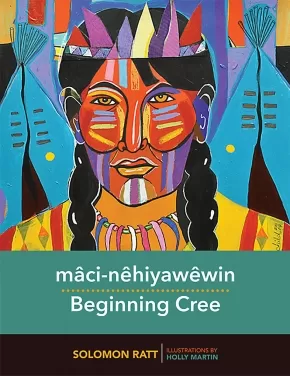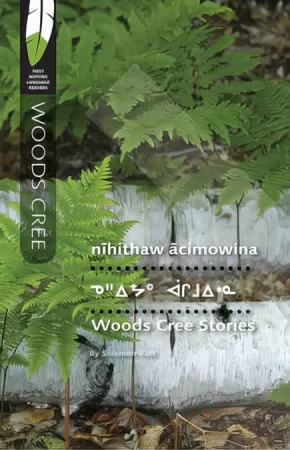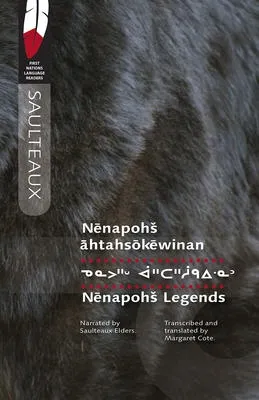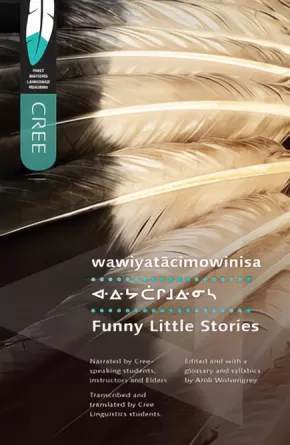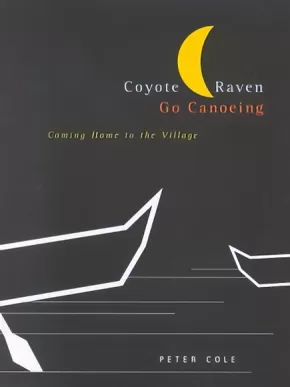
Indigenous Literacy
46
-
50
of
50 Results;
Sort By
Go To
of 4
mâci-nêhiyawêwin: Beginning Cree
$34.95
Artists:
Format:
Coil Bound
Text Content Territories:
Indigenous Canadian; First Nations; Cree (Nehiyawak);
ISBN / Barcode: 9780889774353
Synopsis:
Synopsis:
Designed as an introduction for Cree language learners, Beginning Cree acts as a self-study aid--a much-needed resource in today's world where most students cannot speak Cree fluently. Basic grammar units and everyday vocabulary items guide the student through the building blocks of the language, and expansion drills and exercises reinforce lessons and prepare the student for further study. With over 100 delightful illustrations, Beginning Cree grounds the language in traditional and contemporary contexts.
Educator & Series Information
This book is recommended for ages 12+.
Table of Contents
Chapter One: Introduction
Chapter Two: Nouns
Chapter Three: Prepositions and Pronouns
Chapter Four: Animate Intransitive Verbs
Chapter Five: Inanimate Intransitive Verbs
Chapter Six: Possessives: Kinship Terms
Chapter Seven: Transitive Inanimate Verbs
Chapter Eight: Transitive Animate Verbs
Verb Charts
Conjugation Patterns
Vocabulary List
Bibliography
Notes
The Canadian Indigenous Books for School list recommends this resource for Grades 1-12 for these subject areas: Indigenous Language Studies, Language Studies.
Part of the Indigenous Languages for Beginners series.
The book is specifically geared towards learners of the Plains Cree "Y" dialect, also known as the "Y" dialect.
Additional Information
165 pages | 8.50" x 11.00" | black and white illustrations | spiral bound
Woods Cree Stories
$24.95
Format:
Paperback
Text Content Territories:
Indigenous Canadian; First Nations; Cree (Nehiyawak);
Grade Levels: University/College;
ISBN / Barcode: 9780889773455
Synopsis:
Synopsis:
Humour is not only the best medicine; it is also an exceptionally useful teaching tool.
So often, it is through humour that the big lessons in life are learned--about responsibility, honour, hard work, and respect. Cree people are known for their wit, so the tales in Woods Cree Stories are filled with humour. The book includes nine stories--including Boys Get Lost, Foolishness, and Animals Become Friends--and a Woods Cree-to-English glossary.
All the stories are presented in Cree syllabics, Standard Roman Orthography, and English translation and can be enjoyed by those new to the language and more advanced learners.
Educator & Series Information
Woods Cree Stories is part of the First Nations Language Readers series. With a mix of traditional and new stories, each First Nations Language Reader introduces an Indigenous language and demonstrates how each language is used today. The University of Regina Press’s long-term goal is to publish all 60+ Indigenous languages of Canada.
Additional Information
138 pages | 5.50" x 8.50"
Nenapohs Legends
$19.95
Format:
Paperback
Text Content Territories:
Indigenous Canadian; First Nations; Anishinaabeg; Ojibway; Saulteaux;
Grade Levels: University/College;
ISBN / Barcode: 9780889772199
Synopsis:
Synopsis:
These seven tales are the traditional teaching stories of Nenapohs, the Saulteaux culture hero and trickster. Oral in origin, they have been passed on through generations by the traditional teachers, the Elders.
For the first time, they are published and made available in Nahkawewin or Saulteaux, the westernmost dialect of the Ojibwe language. Each story is illustrated and is presented in both Standard Roman Orthography and syllabics, with English translation. The book also includes a pronunciation guide and a Saulteaux-to-English glossary.
Educator & Series Information
Nenapohs Legends is part of the First Nations Language Readers series. With a mix of traditional and new stories, each First Nations Language Reader introduces an Indigenous language and demonstrates how each language is used today. The University of Regina Press’s long-term goal is to publish all 60+ Indigenous languages of Canada.
Additional Information
112 pages | 5.50" x 8.50" | Narrated by Saulteaux Elders, Transcribed and Translated by Margaret Cote
Funny Little Stories / wawiyatacimowinisa (1 in stock, in reprint)
$12.95
Editors:
Format:
Paperback
Text Content Territories:
Indigenous Canadian; First Nations; Cree (Nehiyawak); Plains Cree; Swampy Cree ; Woodland Cree;
ISBN / Barcode: 9780889771857
Synopsis:
Synopsis:
This is the first in a series of readers in the First Nations languages of the prairie provinces meant for language learners and language users. The stories in this volume come from a variety of sources, all being narrated or written by fluent speakers of Cree, whether students or instructors of the Cree language or Elders. Funny Little Stories is a collection of nine stories representing the Plains Cree, Woods Cree, and Swampy Cree dialects, with a pronunciation guide and a Cree-to-English glossary.
Students and Elders come together in this volume to offer samples of three distinct genres of Cree storytelling: word play, humorous accounts of life experiences, and traditional stories about Wisahkecahk, the trickster-hero.
Each story is illustrated and is presented in both Standard Roman Orthography and syllabics, with English translation.
Educator & Series Information
Funny Little Stories is part of the First Nations Language Readers series. With a mix of traditional and new stories, each First Nations Language Reader introduces an Indigenous language and demonstrates how each language is used today. The University of Regina Press’s long-term goal is to publish all 60+ Indigenous languages of Canada.
Additional Information
110 pages | 5.50" x 8.50" | Narrated by Cree-speaking students, instructors, and Elders | Transcribed and Translated by Cree Linguistics Students | Edited and with a glossary and syllabics by Arok Wolvengrey
Authenticity Note: Because of the contribution of Indigenous Peoples, such as Cree-speaking Elders, to this work on Cree storytelling, it has received the Authentic Indigenous Text label.
Coyote and Raven Go Canoeing: Coming Home to the Village (2 in stock) - ON SALE
$22.00 $32.95
Format:
Paperback
Text Content Territories:
Indigenous;
Grade Levels: University/College;
ISBN / Barcode: 9780773529137
Synopsis:
Synopsis:
A lyrical, epic narrative about Aboriginal knowledge and education.
we are narrators narratives voices interlocutors of our own knowings
we can determine for ourselves what our educational needs are
before the coming of churches residential schools prisons
before we knew how we knew we knew
In a gesture toward traditional First Nations orality, Peter Cole blends poetic and dramatic voices with storytelling. A conversation between two tricksters, Coyote and Raven, and the colonized and the colonizers, his narrative takes the form of a canoe journey. Cole draws on traditional Aboriginal knowledge to move away from the western genres that have long contained, shaped, and determined ab/originality. Written in free verse, Coyote and Raven Go Canoeing is meant to be read aloud and breaks new ground by making orality the foundation of its scholarship.
Cole moves beyond the rhetoric and presumption of white academic (de/re)colonizers to aboriginal spaces recreated by aboriginal peoples. Rather than employing the traditional western practice of gathering information about exoticized other, demonized other, contained other, Coyote and Raven Go Canoeing is a celebration of aboriginal thought, spirituality, and practice, a sharing of lived experience as First Peoples.
Reviews
"One of the clearest and most thorough pictures of an aboriginal view of the consequences of colonization that I have ever read."— Olive Dickason, emeritus, York University
"In the tradition of Gayatri Spivak, Homi Bhabha, Edward Said, Trinh Min-Ha, and other radically original intellectuals, Cole risks a new language to talk about the unthinkable."— Mary Bryson, Department of Educational and Counselling Psychology, University of British Columbia
Additional Information
352 pages | 7.00" x 9.50"
Sort By
Go To
of 4

